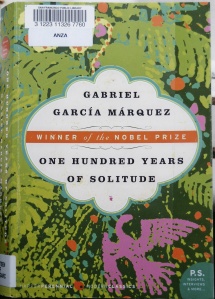Winner of a 1982 Nobel prize for literature and numerous other awards, “One Hundred Years of Solitude” is the story of the Buendia family who founded the mythical town of Macondo in the wilderness interior of Columbia during the mid 19th century. Throughout the next one hundred years and seven generations of their family they live there through good times, a twenty year war, the arrival of foreigners, economic upheaval, harsh rulers, and natural disasters. Macondo seems to be simultaneously isolated (in solitude), and at the crossroads of events in Colombia during the period. Although the overall storyline is simple; that of the town’s history and it’s inhabitants, there are dozens of stories within the lives of these characters which are woven together into the overall history of the Buendia family and Macondo. There is a large cast of characters, many with similar names, so that even with the family tree in the front of the book, I found it necessary to write down the specifics of each character in order to recall them when they are referred to outside their featured scenes. For example, there are over 20 characters with the first name of “Aureliano”. Some of them are minor and the major ones are spread out over the 100 year timeframe. Similarly, there are multiple Arcadio’s, Amaranta’s, Remedios’, and Ursula’s. The name repetition feeds into the larger idea throughout the book; that history is cyclical and events from the past are echoed in successive occurrences.
The central theme of “solitude” is the salient quality in the lives of the central characters. The frequently used word seems to express more than just loneliness and isolation. Alienation, being outcast, are among the implied connotations which may have come out more in the original Spanish. Other themes in the novel include love, especially unrequited love, incest, jealousy, loyalty, prostitution, fate versus free will, the ravages of war, the impact of new technology, exploitation by foreigners, wealth versus poverty, civilization versus nature, religion, death, renewal, and decay. This book required a second reading for me to fully appreciate, as the first time through the characters became confusing. The second reading was enjoyable as things fell into place and I could keep better track of the cast of similarly named characters. There are some humorous moments as well as horrifying, and I was repeatedly impressed by the author’s ability to spin elaborate plot complexities within the overall saga. At our discussion many members remarked that the similar character names were confusing and the ending lacked a clear concluding point. This was attributed to the style of Latin American literature and that it reflected the absurdity of real life. Only two of us in the group enjoyed the book, although others who struggled with it were glad to have read it. The book has been translated into 37 languages and sold over 30 million copies.
Here is a video about the author and the writing of “One Hundred Years of Solitude”
William Sargeant


